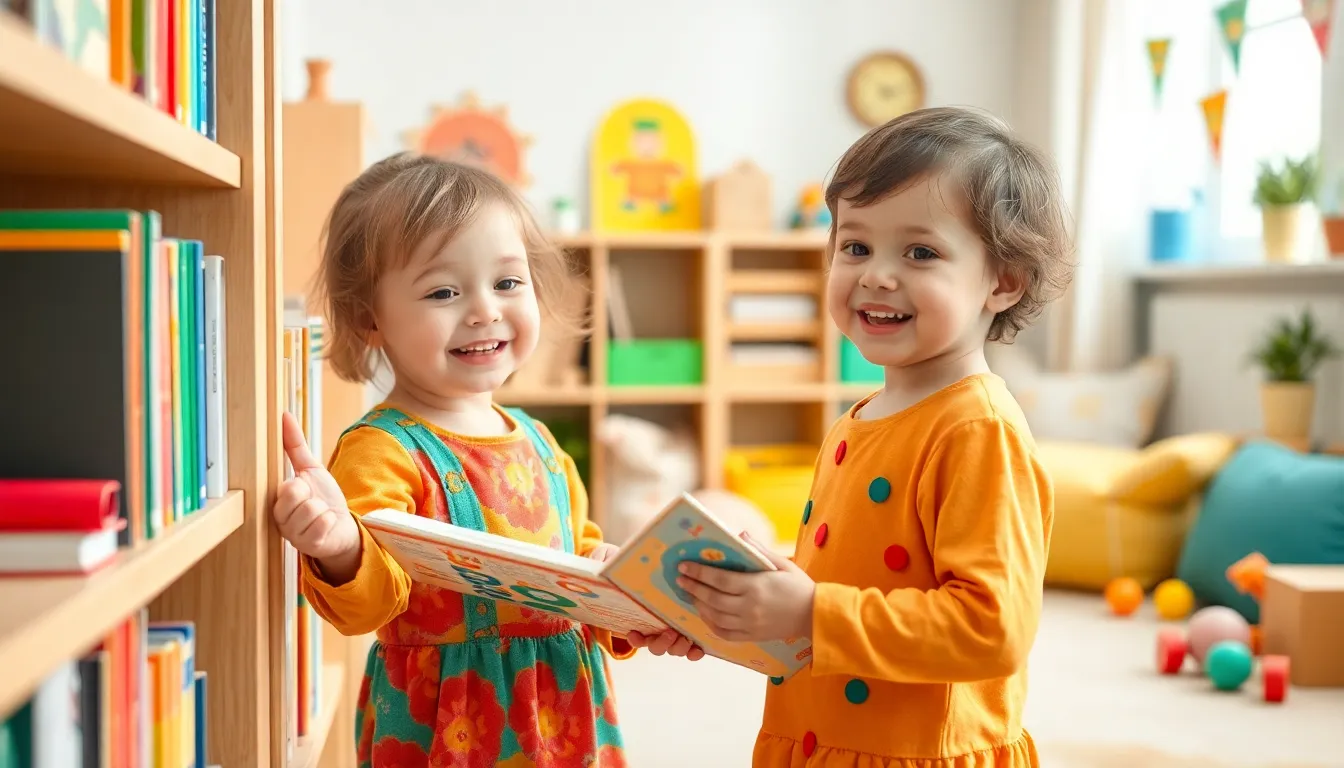Navigating the wild world of preschoolers can feel like trying to herd cats—adorable, chaotic, and full of surprises. As parents, they often find themselves caught in a whirlwind of tiny tantrums, imaginative play, and the occasional crayon masterpiece on the walls. But fear not! With the right tips and a sprinkle of humor, parenting can transform from a daunting task into a delightful adventure.
From mastering the art of negotiation over snack time to understanding the mysterious language of toddler emotions, these parenting tips will equip anyone with the tools to thrive in this exciting stage. After all, preschoolers may be small, but their big personalities can keep parents on their toes. Embrace the chaos and discover how to turn everyday challenges into joyful moments that make parenting a rewarding ride.
Table of Contents
ToggleEssential Parenting Tips For Preschoolers
Establish routines to create a sense of security. Consistent wake-up times, meal schedules, and bedtime rituals help preschoolers feel more comfortable.
Utilize positive reinforcement to encourage good behavior. Praising specific actions, such as sharing toys, reinforces desired behavior.
Encourage independence by allowing preschoolers to make choices. Simple decisions, like picking out their outfits or selecting snacks, boost their confidence.
Set clear and consistent boundaries to guide behavior. Preschoolers thrive when they understand expectations, reducing confusion during daily activities.
Incorporate play into learning experiences. Engaging preschoolers with educational games promotes both cognitive and social development.
Promote emotional intelligence by discussing feelings openly. Naming emotions helps preschoolers understand their feelings and respond appropriately.
Use storytelling to convey values and lessons. Sharing age-appropriate books provides context for moral lessons and stimulates imagination.
Practice patience and active listening. Engaging with preschoolers attentively fosters an environment of trust and communication.
Model healthy habits, from nutrition to exercise. Demonstrating positive behaviors encourages preschoolers to adopt similar habits.
Create a safe and stimulating environment. Ensuring that spaces are organized and age-appropriate allows preschoolers to explore confidently.
Balance structure and flexibility in daily life. While routines matter, allowing some unstructured playtime encourages creativity and spontaneity.
Seek support from other parents or parenting groups. Sharing experiences and solutions fosters a sense of community and provides new insights.
Creating a Positive Environment

Creating a nurturing atmosphere optimizes preschoolers’ emotional and cognitive development.
Setting Up a Routine
Establishing a daily routine offers preschoolers predictability. Consistent schedules help them understand what to expect throughout the day. Morning rituals, snack times, and bedtime routines reinforce a sense of security. Incorporating familiar activities, such as storytime or play, strengthens these routines. Flexibility remains important; adapting the schedule accommodates unexpected changes without causing distress. Engaging preschoolers in routine discussions empowers them and encourages participation. The combination of consistency and adaptability promotes a stable environment for healthy growth.
Encouraging Independence
Fostering independence in preschoolers builds their confidence and decision-making skills. Providing choices, like selecting their outfits or snacks, allows them to express preferences. Encouraging small responsibilities, such as helping with simple chores, promotes a sense of achievement. Praise reinforces their efforts and helps them feel valued. Observing their capabilities is essential; demanding too much can lead to frustration. Balancing independence with guidance ensures they feel supported while exploring their limits. This nurturing approach ultimately cultivates self-reliance and resilience in preschoolers.
Communicating Effectively
Effective communication fosters understanding and builds strong relationships with preschoolers. Strategies that engage them help in navigating challenges and enhancing connections.
Active Listening Techniques
Active listening builds trust and encourages children to share their thoughts. Reflecting back what preschoolers say demonstrates understanding. Asking open-ended questions invites deeper conversations and helps them express feelings. Non-verbal cues, like maintaining eye contact and nodding, show genuine interest. Acknowledging their emotions confirms their feelings are valid, which fosters openness. Responding thoughtfully signals that their input matters, creating a safe space for dialogue. Engaging in play while conversing allows for natural communication, making discussions feel less formal. Encouraging preschoolers to elaborate on their ideas strengthens their communication skills.
Using Positive Language
Positive language promotes a supportive environment for preschoolers. Focusing on what they can do rather than what they cannot encourages positive behavior. Using phrases like “Let’s try this” instead of “Don’t do that” shifts the focus to solutions. Compliments reinforce good actions, while specific praise boosts self-esteem. Clear instructions outlined positively help to minimize confusion. For example, stating “Use your walking feet inside” is preferable to saying “Don’t run.” Modeling optimism in conversations also nurtures a positive mindset. Maintaining a cheerful tone while communicating fosters a joyful learning environment, encouraging preschoolers to engage more actively.
Supporting Learning and Development
Supporting preschoolers’ learning and development occurs through intentional activities and interactions. Parents can play a pivotal role by implementing engaging experiences that stimulate curiosity and growth.
Engaging Activities and Games
Creative activities encourage cognitive and social skills. Parents can incorporate arts and crafts, outdoor explorations, and music into daily routines. Board games that focus on counting or matching enhance critical thinking. Engaging in pretend play fosters imagination and collaboration. Simple puzzles support problem-solving abilities and hand-eye coordination. Scheduling regular playdates allows preschoolers to develop social skills with peers. Crafting scavenger hunts in the backyard sparks adventure and discovery.
Reading Together
Reading cultivates a love for learning and language development. Parents can start by establishing a consistent reading routine, choosing age-appropriate books. Sharing stories promotes vocabulary expansion and comprehension skills. Discussing illustrations and characters helps preschoolers connect with the narrative. Asking open-ended questions stimulates critical thinking and encourages children to express their thoughts. Enjoying interactive books invites participation, enhancing engagement. Selecting a variety of genres exposes children to diverse perspectives and ideas, fostering a deeper understanding of the world.
Managing Behaviors and Discipline
Managing behaviors and discipline in preschoolers requires understanding and creativity. Consistent strategies work best in promoting positive behavior and emotional regulation.
Understanding Preschooler Emotions
Understanding preschooler emotions becomes crucial for effective parenting. These young children express feelings with intensity but often lack the words to articulate them. Parents can benefit from acknowledging emotions like anger, frustration, or joy. Empathizing with preschoolers provides comfort. Instead of dismissing tantrums, parents can validate emotions by saying, “I see you’re upset.” Offering choices encourages expression. This approach fosters a supportive environment where preschoolers feel heard. By guiding discussions about feelings, parents cultivate emotional awareness and resilience.
Implementing Consistent Discipline Strategies
Implementing consistent discipline strategies significantly enhances preschool behavior management. Setting clear expectations minimizes confusion. Parents should clearly articulate rules, using simple language. Positive reinforcement encourages desirable behavior. Praising good actions effectively builds motivation. When discipline is necessary, parents can employ time-outs or natural consequences, allowing preschoolers to understand the impact of their actions. Consistency proves critical; responses to both good and challenging behaviors must remain uniform. Avoiding harsh punishments ensures a nurturing atmosphere. By balancing discipline with affection, parents promote a secure foundation for preschoolers to thrive.
Parenting preschoolers is a unique journey filled with laughter learning and occasional chaos. By embracing the unpredictable nature of this stage parents can create enriching experiences that foster growth and connection. Implementing routines positive reinforcement and open communication lays a solid foundation for emotional and cognitive development.
Encouraging independence while providing guidance helps preschoolers build confidence and resilience. Engaging in fun activities not only stimulates curiosity but also strengthens social skills. Ultimately nurturing a supportive environment where children feel understood and valued allows them to thrive. With patience and creativity parents can transform everyday challenges into cherished moments that shape their child’s future.









